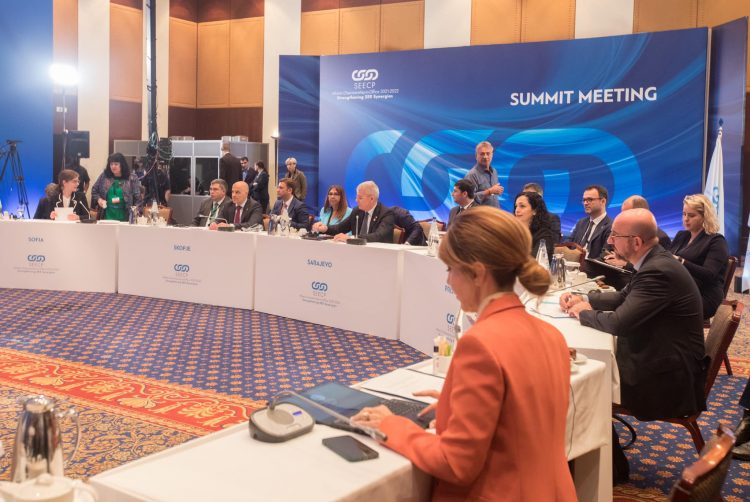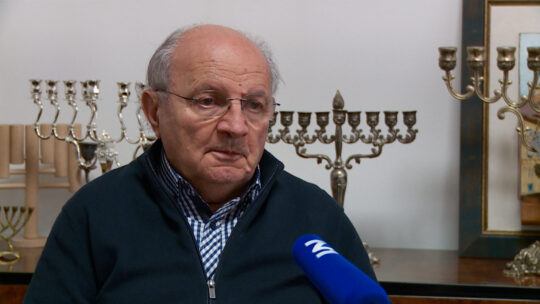
Although the conflict in Ukraine has not spilt over so far, its consequences can be felt in Bosnia as political forces “under Russian influence” are pursuing a secessionist policy, BiH’s tripartite Presidency Chairman, Sefik Dzaferovic, said at the South-East European Cooperation Process (SEECP) Summit in Thessaloniki, Greece, on Friday, arguing that international supervision is still necessary for the country.
Dzaferovic said that “the entire security architecture of the European continent” has now changed and that now it is of the utmost importance to help Ukraine defend itself from aggression.
“The lesson we need to know is that peace will become closer as the aggressor becomes more aware that, as time goes on, they will have to pay an increasingly expensive price,” he said.
“Unlike Bosnia and Herzegovina, which had an unfair embargo on arms imports imposed on it during the 1992-1995 aggression, Ukraine was provided with weapons for defence timely. This shows that, although history repeats itself, the international community is still learning. The most important thing is to preserve European and Euro-Atlantic unity,” Dzaferovic said.
The BiH Presidency member noted that, while the conflict in Ukraine has not spilt over to other countries so far, its implications are significant. He said this can be seen in the Western Balkans, and especially in BiH.
“For more than a year now, a severe political crisis has been going on in my country, which has intensified especially before and after the aggression against Ukraine. It is no secret that there are actors in Bosnia and Herzegovina who are under Russian influence. It was them who, through their activities, called into question the Dayton Peace Agreement and 27 years of its implementation, as they threatened secession and took concrete anti-constitutional steps leading toward that goal,” Dzaferovic said.
He argued that this is being done by threatening Bosnia’s state institutions which the Constitution defines as necessary to preserve the sovereignty and territorial integrity of BiH, such as the unified Armed Forces of BiH, the tax system and the judiciary.
Dzaferovic said the situation is being kept under control thanks to the international community, but that it is still very fragile.
“It is essential that the international community strengthened the mechanisms established in Bosnia and Herzegovina based on Chapter 7 of the UN Charter, which calls for international action to preserve peace,” he said, explaining that he is mainly referring to the Office of the High Representative, the international official tasked with overseeing the civilian implementation of the Dayton Agreement, as well as the EUFOR mission to BiH.
“The High Representative, in fulfilling his obligations under the Dayton Accords and using the powers deriving from that Agreement, has annulled some secessionist moves by the authorities of Bosnia’s Republika Srpska entity that threaten the constitutional order and peace in Bosnia and Herzegovina. At the same time, the High Representative prevented the attempt of some ministers, who, by abusing the right of ethnic veto, tried to suspend democracy in Bosnia and Herzegovina, making the elections conditional on changes to the Election Law,” Dzaferovic said.
He was referring to decisions by High Representative Christian Schmidt, who used his Bonn Powers to suspend an RS Law on Immovable Property and to secure funds necessary for organising the October 2 elections in BiH.
Dzaferovic said the Dayton Agreement stopped the war in BiH but also left room for “domestic actors” to promote and advocate divisions as well as blockades and abuses of the system, especially when it comes to using ethnic and entity veto procedures.
“Simply put, domestic actors have been given the opportunity to block almost every decision and paralyse the entire system with impunity. The only instance that could sanction them and unblock the system is the Office of the High Representative (OHR), which is why it was formed. We need to build domestic accountability mechanisms and complete the system so that we don’t need the OHR. Our goal is not for the OHR to remain forever, but to complete the construction of a functional system so that even when the OHR leaves one day, the state can function independently. Until then, we will need international supervision,” he said.
He elaborated on the goals and future of BiH, emphasising that one of them is the path towards NATO and European Union membership.
“It is clear to us that there are a number of problems within the EU that have resulted in fears of enlargement. But we should never forget that the European Union, despite all the difficulties, has become stronger, better and safer with all the new members than it would have been without them,” he said, adding that he is certain this would also be the case with the inclusion of BiH and other regional countries.
“That is why I expect that at the upcoming European Union-Western Balkans Summit this month, we will strongly support and improve the European path of Bosnia and Herzegovina,” he said.
Dzaferovic welcomed the initiative presented by Slovenia’s President, Borut Pahor, to grant BiH EU candidate status.
He said that, by doing so, the international community would “pay its debt to BiH.”
“In 2004, Bosnia and Herzegovina was side by side with Croatia on the EU path, but due to non-fulfilment of the obligations of the international community set out in the Dayton Agreement, BiH started to lag behind as time went by. I also expect that at the next NATO summit, the NATO integration path of Bosnia and Herzegovina will be strongly supported and improved,” he said.





Kakvo je tvoje mišljenje o ovome?
Budi prvi koji će ostaviti komentar!